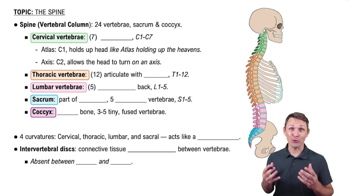7. The Skeletal System
The Spine
Learn with other creators
Practice this topic
- Multiple Choice
In a skiing accident, Marcio broke his T2 and T3. Where is his injury?
1780views33rank - Multiple Choice
Which part of the spine will have fewer individual bones as you age?
1707views41rank - Multiple ChoiceHow many cervical vertebrae are there in a normal adult?1587views
- Multiple ChoiceThe inferior end of the vertebral column is composed of the __________.1531views1comments
- Textbook Question
Mark the following statements as true or false. If a statement is false, correct it to make a true statement.
a. The thoracic and sacral curvatures are the vertebral column's concave curvatures.
581views1rank - Textbook Question
Mark the following statements as true or false. If a statement is false, correct it to make a true statement.
b. A vertebral disc is composed of an inner anulus fibrosus and an outer nucleus pulposus.
594views - Textbook Question
Mark the following statements as true or false. If a statement is false, correct it to make a true statement.
c. The posterior projection from a vertebra is the spinous process.
559views - Textbook Question
Mark the following statements as true or false. If a statement is false, correct it to make a true statement.
d. The sacral, coccygeal, and cervical vertebrae are fused in an adult.
616views





![Vertebral Column Anatomy and Bones [Cervical, Thoracic, Lumbar, Sacral Spine]](https://img.youtube.com/vi/83oTCmkNScc/mqdefault.jpg)